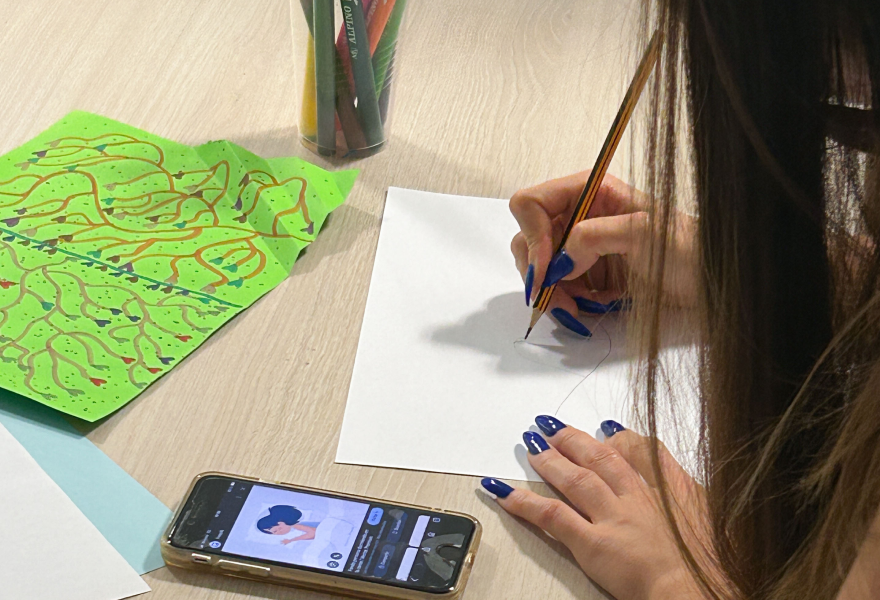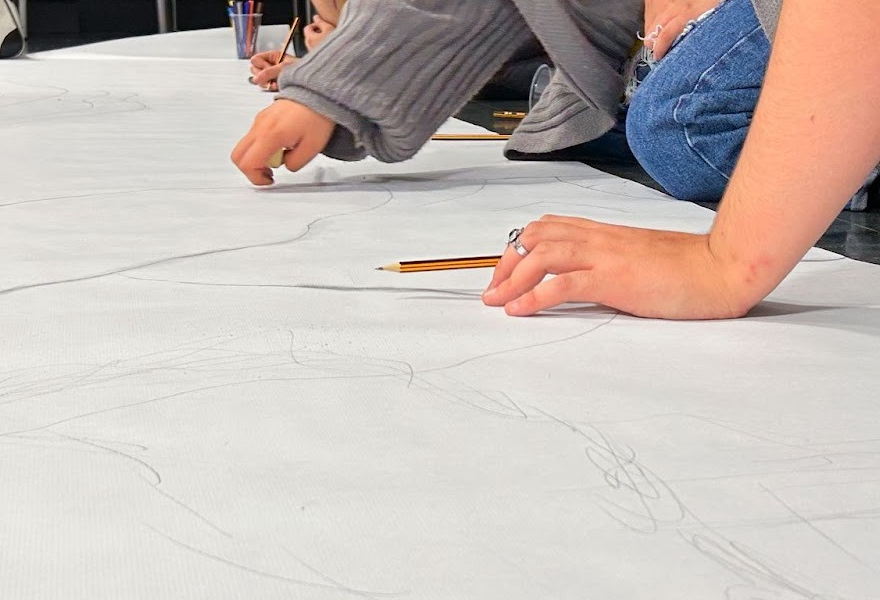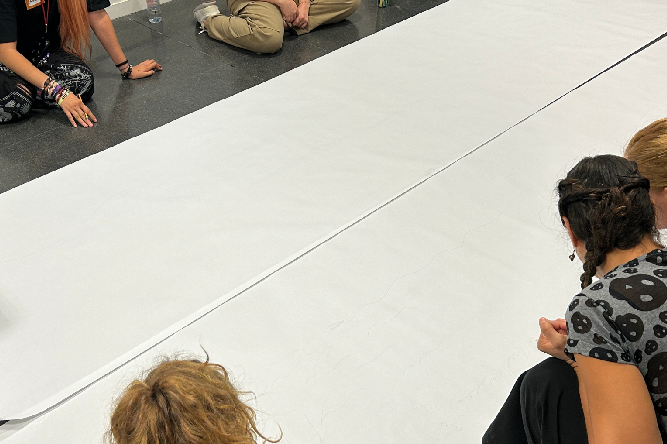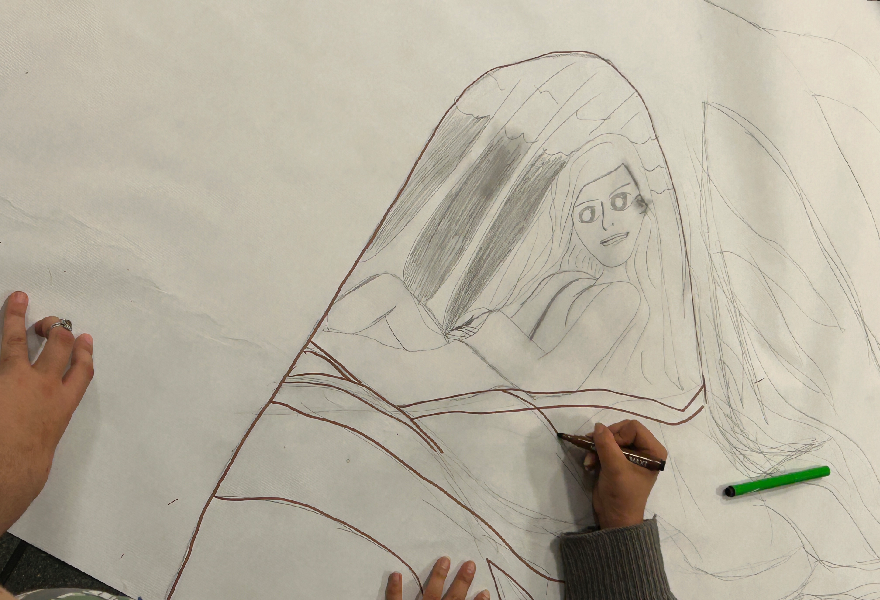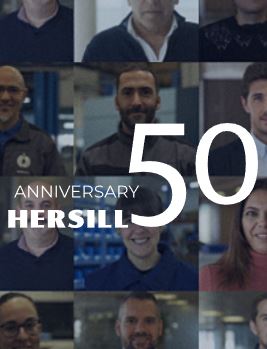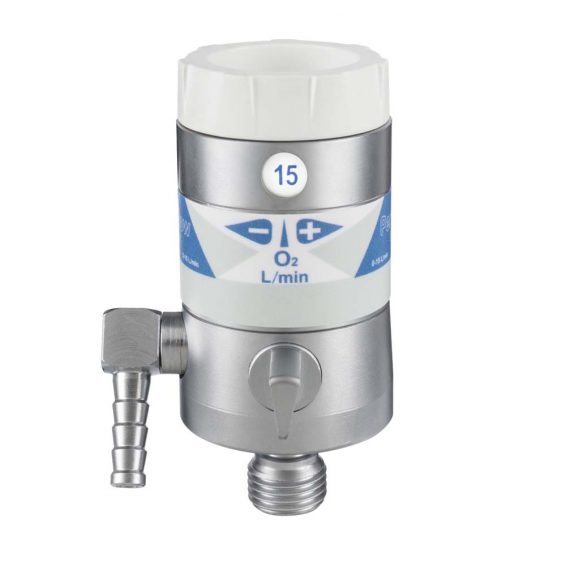HERSILL | NEWS | RSC | LOCAL SOCIAL ACTION | UPDATES |
At Hersill, we believe that medical technology should not only serve health, but also people’s emotional well-being. That is why, as part of our commitment to humanising healthcare, we recently organised, together with the Hospital Clínico San Carlos in Madrid, a unique creative workshop in which patients themselves had the opportunity to imagine how they would like the spaces where they receive their therapies to be. In this way, they became the protagonists of the transformation of their own environment, giving them a voice in a process that focused not only on the physical, but also on the emotional.
The workshop aimed to transform two common rooms in the day hospital’s psychiatry department, where patients carry out activities and therapies, into more welcoming and humane spaces. For three and a half hours, participants not only developed the creative concept, but also actively worked on creating a visual design that will serve as the basis for the digital redesign of these rooms. This process, rather than a mere task of transformation, was a deeply emotional experience that allowed patients to freely express their wishes, wishes that were reflected in every stroke and every idea.
What is most exciting about this workshop, says Oscar Martinez Jordan, manager of Hersill, is seeing patients become protagonists in their own space. Each idea reflects their creativity and emotions, reminding us that caring for health goes beyond the body: it means creating environments where they feel valued and listened to. This experience inspires us to continue humanising every care space.
This workshop also provided an invaluable opportunity for patients to develop their creativity and self-esteem. By working together, they not only created something tangible, but also fostered social interaction, strengthened interpersonal relationships, and promoted group cohesion. Art, as a tool for expression, allowed participants to reduce stress and connect with their emotions in a healthy way. It was a space for emotional release, where therapy and creativity came together to shape an environment that not only reflects the patients’ experiences, but also deeply connects them with their own recovery process.
This workshop, explains Sara Clemente, occupational therapist in the Psychiatry Department at Hospital Clinico San Carlos, “has allowed them to work on some of their skills and abilities, interacting with colleagues from other groups, encouraging participation and creating a relaxed atmosphere where everyone has been able to participate, generating a feeling of greater capacity and achievement.”
This sense of collective creation was key in helping patients develop a feeling of belonging to the space and the therapeutic process. Each stroke and each contribution transformed what might previously have been just a common room into a deeply personal space. Through art, bonds were created that not only improved the physical environment, but also the patient’s emotional and social experience.
The workshop, led by Alabra with the collaboration of teacher Victoria Manjón-Cabeza, sought not only to redesign a physical space, but also to foster the personal and emotional growth of the participants. Through a methodological approach that allowed them to transform their ideas into specific visual elements, the patients felt like active participants in the creation of their own therapeutic space.
This workshop not only had an impact on the physical environment, but also left an emotional mark on patients. We know that humanising healthcare is not achieved solely through technology, but also through actions that touch the deepest emotional well-being of people. Every detail in the therapeutic environment has the potential to create an atmosphere that promotes recovery, bringing hope, strength and life.
This project also aims to raise social awareness of the essential work of mental health professionals and highlight the importance of recognising that mental illness is not invisible. Thus, through their creativity and collaboration, patients not only transformed a physical space, but also created an environment in which they can now see themselves reflected, reaffirming that recovery goes beyond medical treatment: it is also the result of an environment that promotes emotional well-being.
As occupational therapist Sara Clemente points out, “this project is an opportunity to create a more welcoming and meaningful space, where patients themselves can make decisions or collaborate in them, making the space more their own, more welcoming and warmer. This helps to transform the perception of the therapeutic space, which may initially be seen as hostile, into a safe and trustworthy place where patients are listened to and taken into account.”
At Hersill, we remain committed to the humanisation of healthcare, understanding that health is a comprehensive concept that goes beyond physical care. It also involves the emotional, social and psychological well-being of each person, aspects that play a crucial role in their recovery process and quality of life. We believe that care that considers all these dimensions is essential to providing a more comprehensive, humane and effective approach to healthcare.
Hersill is part of the Technologies that make a country campaign (#TecnologíasQueHacenPaís), which showcases the technological companies that develop, manufacture and innovate in Spain. Its work is actively contributing to the strengthening of the national technology industry, the creation of jobs and economic progress, while reinforcing Spain’s industrial autonomy to face the challenges of the future.

